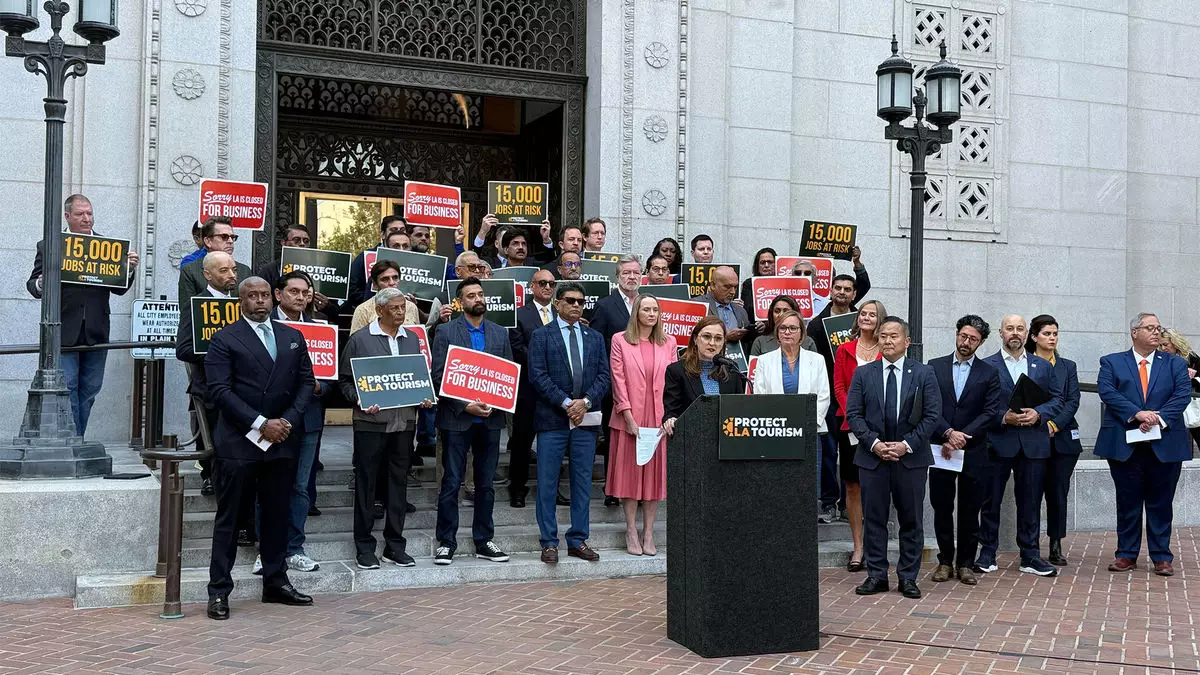In Los Angeles, a proposal to establish a minimum wage of $30 for tourism workers has ignited a heated debate among city officials, business owners, and labor advocates. Dubbed the “Olympic Wage Ordinance,” this ambitious initiative is poignantly timed with the upcoming 2028 Los Angeles Olympics and aims to incrementally increase wages for airport staff and hotel employees at establishments with more than 60 rooms. However, opponents argue that such a dramatic increase could pose a significant threat to an industry that is still working to recover from the dual impacts of the COVID-19 pandemic and devastating wildfires earlier this year.
City councilmember Traci Park raised alarms during a recent gathering at City Hall, warning that adopting this policy could lead to a staggering increase in operational expenses for hotels and businesses—up to 69%—in a matter of two months. Critics highlight that such abrupt increases could decimate employment opportunities, with estimates suggesting that the ordinance could eliminate as many as 14,000 hotel jobs, stifle investment in new hotel construction, and drain millions in tax revenue from state and local coffers.
The Industry’s Heartbeat: Job Losses and Business Viability
The tourism industry, a cornerstone of Los Angeles’s economy, is still grappling with numerous challenges. A report from the American Hotel and Lodging Association underscores the precarious nature of the industry, indicating that an unrealistically high minimum wage would likely deter hotel expansions, as evidenced by the Hilton Los Angeles/Universal City potentially halting its development plans. This raises a critical question: Is the city trading immediate wage gains for long-term stability?
Even as labor organizations advocate for the wage increase as a means to address housing affordability, critics argue that the reality of the current market—where post-pandemic recovery in tourism has lagged—illustrates a misalignment between aspirations and practicality. The data tells a revealing story: major U.S. destinations have rebounded significantly faster, whereas Los Angeles has trailed, reporting a room demand recovery of only 95% compared to pre-pandemic figures.
Intersecting Challenges: Fires, Pandemic, and Global Travel Trends
Los Angeles is not merely fighting economic forces; it faces the compounded effects of natural disasters, such as the unprecedented wildfires in January, which left the tourism sector reeling. “The fires really took the wind out of our sails,” stated Tom Kiely, CEO of Visit West Hollywood, as he reflected on the devastating impact on both bookings and revenue during those critical early months of 2024. Mirroring this sentiment, the decline in international travel to the U.S. exacerbates the struggle, with reports indicating an 11.6% drop in overseas visitors this past March.
The city’s overreliance on leisure travel, particularly international tourism, places it in a vulnerable position. With Los Angeles now out of the top 10 busiest airports globally for passenger traffic, experts warn that the economic recovery efforts could be severely hampered if the international visitor count does not rebound.
Labor’s Perspective: A Call for Equity and Investment
In sharp contrast to the manufacturers of the opposition, labor advocates contend that the $30 minimum wage is not merely a financial elevation for workers but an essential component of equitable economic growth in Los Angeles. Kurt Petersen, co-president of Unite Here Local 11, emphasizes the significance of protecting livelihoods: “Raising wages for tourism workers keeps tens of thousands of families in their homes and boosts our local economy instead of lining corporate pockets.”
Proponents maintain that the wage hike is crucial for fostering a sustainable tourism economy that genuinely benefits Angelenos. With large-scale sports events like the World Cup and the Olympics on the horizon, they argue that a vibrant local economy stands to reap rewards from these international spectacles. The unification of community and business interests, rather than division, may be what Los Angeles requires to navigate these challenging times.
The Future: Balancing Growth with Livelihoods
As the proposal moves forward through the city’s Economic Development and Jobs Committee, it presents an intricate balancing act for policymakers. Will they prioritize fiscal responsibility and employment stability, or embrace a transformative approach that promises a living wage for the most vulnerable workers in the hospitality sector? The decisions made in the upcoming months will not only shape the landscape of Los Angeles’s tourism industry but will also serve as a litmus test for how local governments can manage the intersection of economic healing and social justice in a post-pandemic world.
In this atmosphere of contention, the voices of both sides must be heard. The challenge ahead is not merely a matter of wages; it is about redefining the future of work in a city known for its dynamism and resilience. The choices ahead will illuminate the path toward a more equitable and sustainable Los Angeles.


Leave a Reply